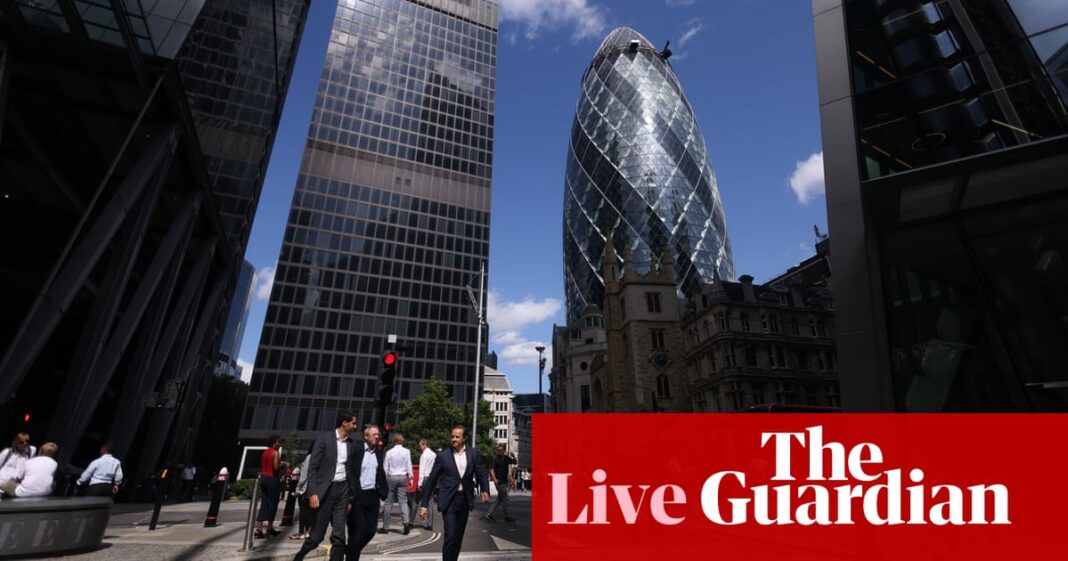BoE chief economist urges caution over rate cuts
Newsflash: The chief economist of the Bank of England has warned against cutting interest rates “too far or too fast”, a day after his boss signalled that the BoE could take a “more aggressive” position.
Huw Pill has told the Institute of Chartered Accountants for England and Wales this morning that there is “ample reason for caution” in assessing how far inflationary pressures have dissipated, and thus how quickly borrowing costs should fall.
Pill says:
While further cuts in Bank Rate remain in prospect should the economic and inflation outlook evolve broadly as expected, it will be important to guard against the risk of cutting rates either too far or too fast.
For me, the need for such caution points to a gradual withdrawal of monetary policy restriction.
This is quite a contrast with governor Andrew Bailey’s comments to the Guardian this week – he told us there was a chance of the Bank becoming more “a bit more activist” in its approach to cutting interest rates, if the news on inflation continued to be good.
Pill is a hawkish member of the Bank’s monetary policy committee – he was one of four policymakers who opposed the rate cut in August, but were outvoted by the other five members of the MPC.
He tells the ICAEW that he hopes to deliver “robust monetary policy” that will guide inflation back to target, while avoiding volatility in economic activity and employment.
Sounding almost evangelical about the Bank’s mission, Pill explains:
Rather price stability is a foundation – you could even argue, the foundation – of a thriving, modern, vigorous and growing UK market economy, which provides opportunities for all: precisely what I would envisage as an ‘economy-fit-for-thefuture’.
Focusing monetary policy on the achievement of price stability is therefore not just a legal and institutional obligation for members of the MPC. It is the right thing to do. That is certainly my view; and I know that I am joined in this by my colleagues. We are in the price stability business.
Key events
The pound is continuing to bounce back this morning.
It’s now up almost half a cent at $1.317, recovering around a third of yesterday’s selloff.
This is thanks to Huw Pill’s hawkish words about interest rates, and also the pick-up in construction sector activity.
Samer Hasn, senior market analyst at brokerage XS.com, says:
Better-than-expected construction data, with activity growing at the fastest pace in two and a half years, boosted the pound’s gains today.
Escalating geopolitical tensions are likely to keep the Bank of England wary of cutting interest rates too quickly as upward risks to inflation mount.

Mark Sweney
Senior Post Office executives treated the company board as a “confessional”, burdening them with huge amounts of paperwork in an attempt to dodge their responsibilities for delivering on the roles, the inquiry into the Horizon IT scandal has heard.
Rachel Scarrabelotti, group company secretary for the Post Office since April 2022, said that respect was lost for the board through the actions of senior executives presenting long papers on operational matters that were not part of their oversight responsibilities.
“They treated the board as a confessional,” she said, giving testimony at the public inquiry into the Post Office and the Horizon IT scandal this morning.
“They would bring all the information they could to the board and tell the board everything hoping it would somehow alleviate them of their responsibility.”
She said that the issues and presentations should properly have been handled by the Post Office’s executives instead.
“It blurs the lines of accountability,” she said. “Respect has been perhaps lost for the board as they are associated with operational matters that are for the executive. Ultimately, the board doesn’t get to fulfill its proper function to be the board.”
She said that Nigel Railton, the interim chair of the Post Office appointed following the firing of Henry Staunton in January, had cracked down on the practice putting strict limits on the length of board papers to stop executives shirking their responsibilities through information overload.
“They now have to be pithy,” she said.
“You have to say what you want, why you want it, and get out.”
The European Union is to adopt tariffs on China-made battery electric vehicles (BEVs) following a vote today.
In a statement the EC says:
Today, the European Commission’s proposal to impose definitive countervailing duties on imports of battery electric vehicles (BEVs) from China has obtained the necessary support from EU Member States for the adoption of tariffs.
This represents another step towards the conclusion of the Commission’s anti-subsidy investigation.
🚨 Just in: due to a high number of abstentions during today’s vote, EU countries failed to agree on a proposal to slap steep tariffs on Chinese electric vehicles, @euronews has learned.
This means the Commission will break the impasse and introduce the tariffs.
— Jorge Liboreiro (@JorgeLiboreiro) October 4, 2024
Back in June, the EC announced it intended to impose tariffs of up to 38% on imports of Chinese electric vehicles, triggering duties of more than €2bn (£1.7bn) a year.
According to Reuters, EU countries failed to vote clearly in favour or against tariffs on Chinese electric vehicles, leaving the European Commission to decide what to do.
Germany has opposed the plan, concerned that a trade war with China would hurt German exports when its economy is already weak.
The London stock market is in the red this morning, with the FTSE 100 share index down 0.3% or 25 points at 8257 points, despite a pick-up in bank shares.
Joshua Mahony, analyst at Scope Markets, says:
The FTSE 100 has struggled for positive momentum in early trade, with much of the index losing ground despite a sharp rise in the latest construction PMI figure.
The banking sector has provided the main tailwind this morning, with traders taking a more cautious approach following comments from BoE Chief Economist Pill that struck a much less dovish tone than that from Bailey yesterday.
While markets remain optimistic that we will see cuts in both November and December, Pill’s preference to remain restrictive in a bid to drive down underlying inflation does highlight the lack of a central dovish narrative that markets might believe exists.
Bank of England chief economist Huw Pill has “poured cold water” over yesterday’s dovish comments from governor Andrew Bailey, says Matthew Ryan, head of market strategy at global financial services firm Ebury.
Ryan explains:
Pill reiterated the MPC’s official stance that the bank remains wary of cutting rates too deeply or too quickly, highlighting continued concerns over structural issues that could keep UK inflation elevated for longer.
“His communications provide an element of validation to our view that markets perhaps took Bailey’s words too literally, and as a confirmation of faster cuts ahead, rather than merely a warning that this is a possibility. Indeed, we were somewhat perplexed and thrown off guard by Bailey’s comments, as we do not believe that UK data since the last MPC meeting has necessarily deteriorated to an extent that would warrant a shift to a more dovish stance.”
Political certainty + reducing interest rates accelerated construction growth at the start of the autumn term. Civil engineering excelled with increased demand for renewable energy infrastructure and an uplift in work on major projects. Meanwhile commercial and house building… pic.twitter.com/xzE8ZEW6bf
— Emma Fildes (@emmafildes) October 4, 2024
UK construction sector posts fastest upturn since April 2022
September was a strong month for the UK construction sector, partly due to falling borrowing costs, new data shows.
The latest survey of purchasing managers across UK building firms has found that business activity accelerated to its fastest rate in nearly two-and-a-half years.
Builders report a rise in new work, thanks to increased willingness-to-spend among clients and a more supportive economic backdrop.
This lifted the S&P Global UK Construction PMI to 57.2 in September, up from 53.6 in August, signalling faster growth (50 poinst = stagnation).
The S&P Global UK Construction PMI in September 2024 was 57.2, up from 53.6 in August. 50=no monthly change in construction activity so it reflects construction growth in September, for a 7th consecutive month, & its highest rate in 29 months. (1/n) #ukconstruction #ukhousing pic.twitter.com/uM38EHTkNy
— Noble Francis (@NobleFrancis) October 4, 2024
Civil engineering, commercial building, and house building all strengthened.
Indeed, the upturn in residential work was the fastest since March 2022, suggesting recent falls in mortgage rates are stimulating the market.
Tim Moore, economics director at S&P Global Market Intelligence, says:
“UK construction companies indicated a decisive improvement in output growth momentum during September, driven by faster upturns across all three major categories of activity.
A combination of lower interest rates, domestic economic stability and strong pipelines of infrastructure work have helped to boost order books in recent months.
Huw Pill also explained the ICAEW that the Bank of England introduced a new form of communication, identifying three distinct cases to characterise the economic outlook.
He says:
The first case sees disinflation from here as a process largely independent of other developments in the economy. Disinflation owes to a self-sustaining virtuous cycle of declining headline inflation, falling inflation expectations, weaker pay growth and easing domestic services price inflation. Just as inflation rose on the back of external shocks, it will revert to target as those shocks recede.
The second case also foresees continued disinflation. This again owes to the selfsustaining virtuous cycle of declining headline inflation which I already outlined. But what is distinctive here is that this virtuous cycle relies on the maintenance of a restrictive monetary policy stance to bear down on inflationary pressures. Bank Rate will need to fall over time, but at a pace that ensures sufficient restriction is maintained in the transition for UK inflation to reach target in a lasting and sustained manner, not just fleetingly or in passing.
The third case posits deeper structural changes in the UK economy that threaten to impart a more lasting inflationary dynamic, if not met with an equally lasting monetary policy response necessary to return inflation to target and keep it there.
Those three scenarios cover the range of views on the MPC, from the doves who want to cut rates to the hawks who are more worried about inflation.
Pill says he sees merits in all three options, but that his “modal outlook” is probably closest to the second case.
Huw Pill kicked off his speech to the chartered accountants with a joke, declaring:
In giving a talk to such a distinguished group of accountants, I am reminded of a famous joke about economists: ‘An economist is someone who wanted to be an accountant, but didn’t have the personality’.
At least, that is what passes for humour among economists. Perhaps it proves the point – although, on reflection, I am not sure which profession should take greater offence.
Pill’s predecessor, Andy Haldane, was more of a punster, remarking once that “Economists exist to make the weathermen look good”.
Pill speech shows MPC “split” over interest rates
Simon French, chief economist at investment bank Panmure Liberum, says Huw Pill is “striking a different tone” to Andrew Bailey in his interview with the Guardian.
French adds:
Market doesn’t believe it with 92% likelihood of November cut, & 60% for a December follow-up cut. But it is a clear message even the internal MPC members are split on pace of removing restrictiveness:
BoE Chief Economist, Huw Pill, striking a different tone to Governor Bailey’s soundbite yesterday. Considerable caution and a preference for the Bank’s Scenario 2 – prolonged restrictive monetary policy to bear down on persistent inflation components. Market doesn’t believe it…
— Simon French (@Frencheconomics) October 4, 2024


